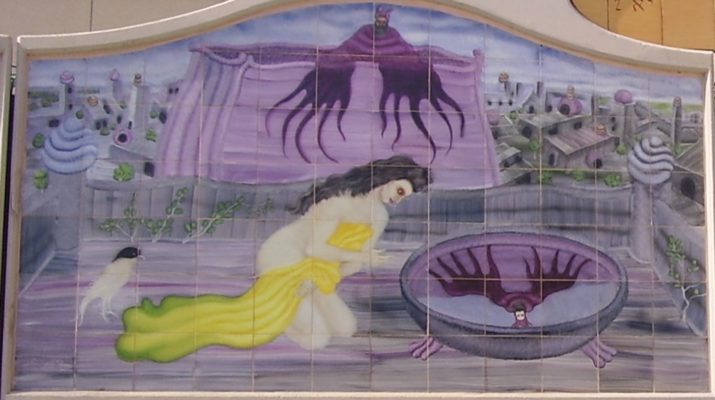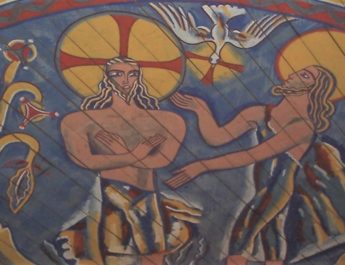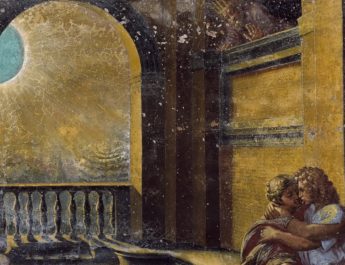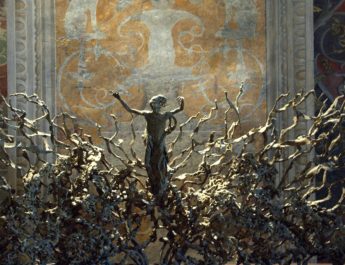2 Samuel 11:2-15
A Women’s Lectionary – Proper 21
2 It happened,A lateB one afternoon when DavidC roseD from his couchE
A “happened” = hayah. This is to be or become, to happen.
B “late” = et. Probably from anah (to answer, sing, announce); from ad (forever, all, old); from adah (to pass on, advance, decorate oneself). This is a period or season. It can also mean whenever or continually.
C “David” = David. From the same as dod (beloved, love, uncle); the root may mean to boil, which is used figuratively to describe love. So, this implies someone you love such as a friend, a lover, or a close family member like an uncle. David’s name likely means something like “beloved one.”
D “rose” = qum. To arise, stand, accomplish, establish, abide. This is rising as in rising against, getting up after being sick or asleep, arising from one state to another, becoming powerful, or rising for action. It can also be standing in a figurative sense.
E “couch” = mishkab. From shakab (to lie down, lodge; lying for sleep, sex, or other reasons). This is a place where one lies down i.e. a bed, couch, or bedchamber. It can also be used in an abstract sense to refer to sleep or euphemistically for sex.
and was walkingF about on the roofG of the king’sH house,I
F “walking” = halak. This is go, come, walk. It is walk literally and figuratively and includes people and animals. It can be used figuratively for one’s moral life – how we walk according to God’s way or against it. It can also refer to the walk of life as in the course one’s life takes, the choices we make, etc.
G “roof” = gag. Perhaps from ga’ah (to rise up, increase, grow, be highly exalted; figuratively to be majestic). This is a housetop or other top. It can refer to the surface of an altar.
H “king’s” = melek. From malak (to be or become king or queen, to rise to the throne, to be crowned; by implication, to take counsel). This is king or royal.
I “house” = bayit. Probably from banah (to build, make, set up, obtain children; to build literally or figuratively). This is house, court, family, palace, temple.
that he sawJ from the roof a womanK bathing;L the woman was veryM beautiful.N
J “saw” = raah. This is to see in a literal or figurative sense so stare, advise, think, view.
K “woman” = ishshah. From ish (man); perhaps from enosh (human, humankind, mortal); from anash (to be weak, sick, or frail). This is woman, wife, or female.
L “bathing” = rachats. This is to wash, wash away – it can be complete or partial.
M “very” = meod. Perhaps from the same as uwd (firebrand, a poker). This is very, greatly, exceedingly. It can also mean vehemence, force, abundance.
N “beautiful” = tob + mareh. Tob is from tob (to be pleasing, to be good). This is good, beautiful, pleasant, agreeable, bountiful, at ease. This word is used for goodness as a concept, a good thing, a good person. This can refer to prosperity and welfare as well as joy, kindness, sweetness, and graciousness. So, this is ethically good, but also enjoyably good. Mareh is related to “saw” in v2. From raah (see note J above). This is sight, appearance, or vision. It can be a view, seeing itself, that which is seen, something real, or a vision one sees.
3 David sentO someone to inquireP about the woman. It was reported, “This is BathshebaQ daughterR of Eliam,S
O “sent” = shalach. This is to send out, away, send for, forsake. It can also mean to divorce or set a slave free.
P “inquire” = darash. This is seek, ask, inquire, care for. Generally it means following in pursuit or following as part of a search, which implies seeking or asking. Also used specially to mean worship.
Q “Bathsheba” = Bath-sheba. Related to “house” in v2. 11x in OT. From bath (daughter in a literal or figurative sense; can also be branch) {from ben (son literal or figurative; also, grandson, subject, nation); from banah (see note I above)} + perhaps shaba (to swear, curse, vow, make a covenant; properly, to be complete; this is to seven oneself – as in affirming something so strongly it is as though it were said seven times) {perhaps from sheba (seven – the number of perfection/sacred fullness)}. This is Bathsheba, perhaps meaning “daughter of oath.”
R “daughter” = bat. Related to “house” in v2 & “Bathsheba” in v3. From ben (see note Q above). This is daughter in a literal or figurative sense.
S “Eliam” = Eliam. 2x in OT. From el (God or god) + am (people or nation; a tribe, troops or armies, or figuratively to refer to a flock of animals); {from amam (to darken, hide, associate; creating shadows by huddling together)}. This is Eliam, a name meaning “God is kinsman,” “God of the people,” or “God’s people.” See https://www.abarim-publications.com/Meaning/Eliam.html
the wifeT of UriahU the Hittite.”V
T “wife” = ishshah. Same as “woman” in v2. See note K above.
U “Uriah” = Uriyah. Related to “happened” in v2. From ur (fire, light, the east); {from or (to be or become light, shine)} + Yah (the shortened form of the name of the God of Israel; God, Lord); {from YHVH (proper name of the God of Israel; God, Lord; the self-existent or eternal one); from havah (to become) or hayah (see note A above)}}. This is Uriah or Urijah, a name meaning “flame of the Lord,” “the Lord is light,” “light of the Lord.” See https://www.abarim-publications.com/Meaning/Uriah.html
V “Hittite” = Chitti. From cheth (Heth or Cheth; one of Canaan’s sons from whom perhaps the Hittites descend) OR from hatat (terror, lacking strength or courage); perhaps from hata (to seize; often used of coals from a fire). This is Hittite – perhaps meaning terrors or terrible. See https://www.abarim-publications.com/Meaning/Hittite.html#.XyMgpp5KhPY
4 So David sent messengersW to getX her, and she cameY to him, and he layZ with her.
W “messengers” = malak. This is a messenger, an angel, or a deputy of some kind. Can be used for human messengers literally or for prophets, priests, or teachers as messengers of God. Also used for supernatural messengers i.e. angels.
X “get” = laqach. This is to take, accept, carry away, receive. It can also have the sense of take a wife or take in marriage.
Y “came” = bo. This is to enter, come in, advance, fulfill, bring offerings, enter to worship, attack. It can also have a sexual connotation.
Z “lay” = shakab. Related to “couch” in v2. See note E above.
(Now she was purifyingAA herself after her period.)BB Then she returnedCC to her house.
AA “purifying” = qadash. From qodesh (set apart and so sacred; God is different from us and so God is holy/set apart; things we dedicate to God’s service are set apart for God and so they, too, are holy). This is set apart, consecrated, hallowed, sanctified. This is something or someone that is set apart for a holy purpose or use – ceremonially or morally clean.
BB “period” = tum’ah. From tame (becoming unclean, foul, defiled; polluted, particularly in a ritual or moral sense). This is filthiness or uncleanness. It can refer to ritual or moral impurity.
CC “returned” = shub. To turn back, return, turn away – literally or figuratively. Doesn’t necessarily imply going back to where you started from. This is also the root verb for the Hebrew word for repentance “teshubah.”
5 The woman conceived,DD and she sent and toldEE David, “I am pregnant.”FF
6 So David sent word to Joab,GG “Send me Uriah the Hittite.” And Joab sent Uriah to David. 7 When Uriah came to him, David askedHH how Joab and the peopleII
DD “conceived” = harah. This is to conceive or be pregnant – it can be literal or figurative.
EE “told” = nagad. This is to declare, make conspicuous, stand in front, manifest, predict, explain.
FF “pregnant” = harah. Related to “conceived” in v5. 16x in OT. From harah (see note DD above). This is conceive or pregnant.
GG “Joab” = Yoab. Related to “happened” in v2 & “Uriah” in v3. From YHVH (see note U above) + ab (father, ancestor, grandfather; father in a literal or figurative sense). This is Joab or Yoab, meaning “the Lord is father.”
HH “asked” = shaal. This is to ask, inquire, beg, borrow, desire, request. It can also mean to demand.
II “people” = am. Related to “Eliam” in v3. See note S above.
faredJJ and how the warKK was going.LL
JJ “fared” = shalom. From shalam (to be complete or sound; to have safety mentally, physically, or extending to one’s estate; so, if these things are safe and complete, the implication is that one would be friendly; and, if being friendly, one would make amends and that friendship would be reciprocated). This is completeness, soundness, welfare, favor, friend, good health. It is to be safe and figuratively well, happy, at peace, friendly. Abstractly, it includes the ideas of welfare and prosperity (not in excessive wealth, but in having enough).
KK “war” = milchamah. From lacham (to eat or feed on; figuratively, to battle as a kind of consumption/destruction). This is battle, war, fighting, or one who fights (i.e. a warrior).
LL “was going” = shalom. Same as “fared” in v7. See note JJ above.
8 Then David said to Uriah, “Go downMM to your house and washNN your feet.”OO Uriah went outPP of the king’s house, and there followedQQ him a presentRR from the king.
MM “go down” = yarad. This is to go down, descend; going down in a literal or figurative sense. It can be going to the shore or a boundary, bringing down an enemy.
NN “wash” = rachats. Same as “bathing” in v2. See note L above.
OO “feet” = regel. This is foot, endurance, or journey. It is a foot as the means of walking and so it implies a step or a greater journey. It can be used euphemistically for private parts.
PP “went out” = yatsa. This is to go or come out, bring forth, appear. It is to go out in a literal or figurative sense.
QQ “followed” = yatsa + achar. Yatsa is the same as went out” in v8. See note PP above. Achar is from achar (to remain behind, linger, continue, be behind, or delay; can also imply procrastination). This is after or the last part, following.
RR “present” = maseth. 16x in OT. From nasa (to lift in a broad sense, literally and figuratively; to carry, take, or arise; to bring forth, advance, accept). This is an utterance, lifting up, collection, uprising, a rising flame or beacon, a present lifted up, a mess, reproach, or burden.
9 But Uriah sleptSS at the entranceTT of the king’s house with allUU the servantsVV of his lordWW and did not go down to his house.
SS “slept” = shakab. Same as “lay” in v4. See note Z above.
TT “entrance” = pethach. From pathach (to open wide in a literal or figurative sense; to open, draw out, let something go free, break forth, to plow, engrave, or carve). This is any kind of opening – a door, entrance, gate.
UU “all” = kol. From kalal (to complete). This is all or every.
VV “servants” = ebed. From abad (to work, serve, compel; any kind of work; used causatively, can mean to enslave or keep in bondage). This is a servant, slave, or bondservant.
WW “lord” = adon. From a root that means ruling or being sovereign. This is lord, master, or owner.
10 When they told David, “Uriah did not go down to his house,”
David said to Uriah, “You have just come from a journey.XX Why did you not go down to your house?”
11 Uriah said to David, “The arkYY and IsraelZZ and JudahAAA
XX “journey” = derek. From darak (to tread, march, to walk. Can also mean affixing a string to a box since one needs to step on it to bend it in the process; so also an archer). This is a road as a thing that is walked on. Can be used figuratively for the path that one’s life takes or how one chooses to live one’s life.
YY “ark” = aron. Perhaps from arah (to gather or pluck). This is a chest, box, or coffin. It is used for the Ark of the Covenant.
ZZ “Israel” = Yisrael. Related to “Eliam” in v3. From sarah (to persist, exert oneself, contend, persevere, wrestle, prevail) + el (see note S above). This is Israel, meaning God strives or one who strives with God; new name for Jacob and for his offspring. This refers to the people and to the land.
AAA “Judah” = Yehudah. Probably from yadah (to throw one’s hands into the air in a gesture of praise); from yad (hand). This is Judah, meaning “praised.”
remainBBB in booths,CCC and my lord Joab and the servants of my lord are campingDDD in the openEEE field;FFF
BBB “remain” = yashab. This is to sit and so to remain and so to dwell. It is sitting for any reason – as a judge, in order to ambush, or just sitting quietly. Causatively, this can mean settling or marrying. This can also mean continue, endure, or establish.
CCC “booths” = sukkah. From sok (lair, thicket, den, or hiding place; a den or pavilion as made of intertwined boughs); from sakak (to interweave, knit). This is a booth, canopy, shelter, tent, or tabernacle. This is also the “sukkah” from the Jewish holiday “sukkot,” which remembers the wilderness wanderings.
DDD “camping” = chanah. This is decline, bending down, or living in tents. It can be camping to create a home or camping as a part of battle.
EEE “open” = paneh. From panah (to turn, face, appear). This is face in a literal or figurative sense. It could be face, presence, anger, respect. It can also be used of God to indicate divine favor or presence.
FFF “field” = sadeh. This is literally field, ground, soil, or land. It can be used to mean wild like a wild animal.
shall I then goGGG to my house to eatHHH and to drinkIII and to lie with my wife? As you liveJJJ and as your soulKKK lives, I will not doLLL such a thing.”MMM
GGG “go” = bo. Same as “came” in v4. See note Y above.
HHH “eat” = akal. This is to eat, devour, burn up, or otherwise consume. It can be eating in a literal or figurative sense.
III “drink” = shathah. This is to drink literally or figuratively. It could also be a drinker.
JJJ “live” = chay. From chayah (to live or keep alive literally or figuratively). This is alive, living, lifetime. It can also be used to describe someone’s age. It can refer to animals, plants, water, or a company or congregation of people. It is life in a very broad sense.
KKK “soul” = nephesh. Related to naphash (to refresh or be refreshed). This is soul, self, person, emotion. It is a breathing creature. Can also refer to appetites and desires.
LLL “do” = asah. This is to make, do, act, appoint, become in many senses.
MMM “thing” = dabar. From dabar (to speak, declare, discuss). This is speech, a word, a matter, an affair, charge, command, message, promise, purpose, report, request. It is a word, which implies things that are spoken of in a wide sense.
12 Then David said to Uriah, “Remain here todayNNN also, and tomorrowOOO I will send you back.” So Uriah remained in JerusalemPPP that day.QQQ
NNN “today” = yom. Root may mean being hot. This is the day in a literal or figurative sense. It can also mean birth, age, daylight, continually or other references to time.
OOO “tomorrow” = machar. Related to “followed” in v8. Perhaps from achar (see note QQ above). This is tomorrow or later. It is some kind of deferred time, so it could also mean indefinitely or refer to the time to come.
PPP “Jerusalem” = Yerushalaim. Related to “fared” in v7. From yarah (to throw, shoot, be stunned; to flow as water so figuratively to instruct or teach) + shalam (see note JJ above). This is Jerusalem, dwelling of peace.
QQQ “day” = yom. Same as “today” in v12. See note NNN above.
On the nextRRR day, 13 David invitedSSS him to eat and drink in his presenceTTT and made him drunk,UUU and in the evening he went out to lie on his couch with the servants of his lord, but he did not go down to his house.
RRR “next” = mochorath. Related to “followed” in v8 & “tomorrow” in v12. From the same as machar (see note OOO above). This is the day after or the next morning.
SSS “invited” = qara. This is to call or call out – to call someone by name. Also used more broadly for calling forth.
TTT “presence” = paneh. Same as “open” in v11. See note EEE above.
UUU “made…drunk” = shakar. 19x in OT. This is to be filled with drink, merry, tipsy. It can be satiated in a positive sense or drunken in a negative sense. It can also figuratively refer to influence.
14 VVVIn the morningWWW David wroteXXX a letterYYY to Joab and sent it by the handZZZ of Uriah.
VVV {untranslated} = hayah. Same as “happened” in v2. See note A above.
WWW “morning” = boqer. From baqar (to seek, plow, break forth, admire, care for). This refers to the break of day. So it is dawn, early, morning, or morrow.
XXX “wrote” = kathab. This is to inscribe, write, record, or decree.
YYY “letter” = sepher. Perhaps from saphar (to tally or record something; to enumerate, recount, number, celebrate, or declare). This can be writing itself or something that is written like a document, book, letter, evidence, bill, scroll, or register.
ZZZ “hand” = yad. This is hand, ability, power. Hand in a literal sense, but also what one can do or the means by which one does it.
15 In the letter he wrote, “SetAAAA Uriah in the forefrontBBBB of the hardestCCCC fighting,DDDD and then draw backEEEE from him, so that he may be struck downFFFF and die.”GGGG
AAAA “set” = yahab. This is give, put, bring, take. It is to give in a literal or figurative sense.
BBBB “forefront” = mul + paneh. Mul is perhaps from mul (to cut short, circumcise, blunt, destroy). This is in front of, opposite, with, abrupt. Literally, it refers to some kind of precipice. Paneh is the same as “open” in v11. See note EEE above.
CCCC “hardest” = chazaq. From chazaq (to strengthen, seize, be courageous, repair, bind, heal, conquer, harden). This is strong, hard, powerful, loud, bold, violent, impudent. It is usually strong in a negative sense.
DDDD “fighting” = milchamah. Same as “war” in v7. See note KK above.
EEEE “draw back” = shub. Same as “returned” in v4. See note CC above.
FFFF “struck down” = nakah. This is to hit whether lightly or severely. It can be used in a literal or figurative sense. So, this could be beat, punish, give wounds, kill, or slaughter.
GGGG “die” = mut. This is to die in a literal or figurative sense. It can also refer to being a dead body.
Image credit: “David and Batsheva” painting at the Castra Center in Haifa, Israel. Photo by Dr. Avishai Teicher, 2012.




